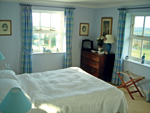Guide to starting a B&B
When children flee the nest, many country-house owners are putting their spare bedrooms to work as B&Bs


Exquisite houses, the beauty of Nature, and how to get the most from your life, straight to your inbox.
You are now subscribed
Your newsletter sign-up was successful
The face of the British bed-and-breakfast (B&B) has changed. Gone are the days of murky counterpanes, shared bathrooms, and scratchy landladies complete with furry slippers and drooping cigarettes. In their place have come white bed linen, fresh flowers, organic breakfasts, higher price tags and a more discerning clientele. Letting out a spare room or two for an average of £75 a night can raise useful pocket money, but with an estimated 20,000 B&Bs operating around the countryside, there are some important considerations to take into account before cracking some eggs into a frying pan. Personality is a big part of creating a successful B&B, and the reality is that some people are just not programmed that way. 'You've got to be the right sort of person,' advises David Weston, co-author of How to start and run a B&B. 'A methodical housekeeper, who is also good with people and is happy to have strangers in their house.' Clarissa Roe, who has been in the business for more than 10 years, agrees. 'You have to try and accommodate people as much as possible. Don't boot them out after breakfast and insist they can't come back until teatime.' Marketing is the next big hurdle. In the 1990s, it seemed de rigueur for those wishing to capture the upper end of the B&B market to appear in the Wolsey Lodge guidebook, but these days Alistair Sawday's Special Places to Stay series has the edge. 'You have to part with about £500 for the privilege,' explains Mrs Roe, who has recently had to start over again after moving from Marlborough to Hillbrow House, Umberleigh in Devon. 'But this is recouped fairly quickly.' The other option is to advertise with the Tourist Board, which involves laying yourself open to incognito visits and health-and-safety inspections and has been known to attract the taxman on occasion. 'It definitely brings in the business,' insists Isabel Green, who has guests at The Manor, Upavon, on the edge of the Salisbury Plain. 'But they have a checklist of requirements such as loo-roll holders and bathroom bins, and they will run their fingers along the top of picture frames to check for dust.' And, of course, internet marketing is an absolute must. 'Being on the first page of Google's results is so important,' says Mrs Green. 'For that I use www.britainsfinest.co.uk.' There is no official regulation body for B&Bs, according to Mr Weston, who is also chairman of the Bed & Breakfast Association. 'But it's worth carrying out a few precautions: having a fire-risk assessment done on the property, complying with food standards hygiene advice for example. Also, according to planning, the limit is set at three let rooms before the status of a property should change to that of a hotel.' Income is the big unknown. Two hard-working bedrooms could earn a tidy £40,000 a year for owners dedicated to the cause. The variables to juggle when forecasting are the location, availability and the inevitable 'no shows'. But the bonus is that expenses incurred, including a proportion of the utility bills, are offset against tax. There's no question that doing B&Bs assiduously can be a bind. Rushing back from weddings for guests who never turn up is not unheard of, and things can go missing. B&B lore tells of a guest whose picture flashed up on screen during an episode of Crimewatch, but the general impression is positive and quite heart warming. People are rather nice! DO Buy good beds Have en-suite bathrooms Take out liability insurance Buy a Miele rotary iron Take guests' mobile numbers Be cautious about dogs Have lots of keys cut DON'T Bother with credit cards Be old-fashioned about relationships Be fussy about children Be nervous about bookings from abroad Say you're away; say you're 'full' Set ambitious targets in the first year Forget to alert locally based businesses
Exquisite houses, the beauty of Nature, and how to get the most from your life, straight to your inbox.

